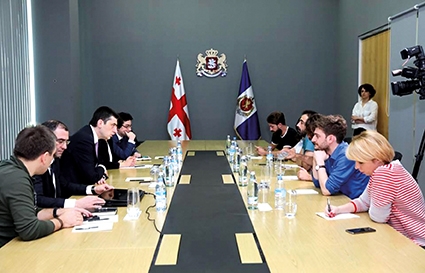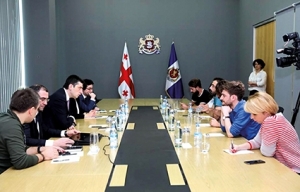Drug Policy Debate Continues
On May 12, Georgia’s Ministry of Internal Affairs conducted a raid on two of Tbilisi’s most popular nightclubs, Bassiani and Café Gallery, while the Saturday night party was in full swing. Eight drug dealers were arrested before the raids were conducted. The clubs remained closed on the order of the Ministry of Internal Affairs while they conducted their investigation. Bassiani was reopened on Thursday, May 24, after more than a week of worries that it may be forced out of business due to financial pressure.
On the 22, the Deputy Interior Minister, Nino Javakhadze, made a statement on the investigations, saying that strict sanctions should be imposed for drug-related offenses. She said that the Ministry strives to “not to encourage drug use and not to make it a source of crime,” but that “discussion is underway about how humane the drug policy may be towards drug users.” This framing of drug users as criminals is still the most common perception in Georgia. Javakhadze said that it would be “wrong to relate this [investigation] to political processes,” but it is difficult to separate the two as the raids led to protests, then a dialogue on the drug policy between the protest leaders and the government.
Akaki Zoidze, Chairman of the Healthcare Committee of Parliament, held an important meeting in the Georgian Dream central office on Tuesday, after which he said that the positions of members of the ruling party on the drug policy have moved closer to each other, but that discussions will continue. Zoidze claims that all members, including Party Chairman Bidzina Ivanishvili, support a humane drug policy. In fact, “humane” has been the key word used by the government throughout the discussions.
Zoidze promises that by June 7, the party will have come to a unified conclusion, saying, "There has not been any principled confrontation, but we still have time to reach a final decision...Decision-making will not last forever. If necessary, an internal ballot will be held.” Zoidze supports toughening penalties towards drug dealers but humanizing the policy towards users and those suffering from addiction. He stated that the members of the internal party discussions agree that “people should not go to jail only for consumption.”
Georgian Dream MP Kakha Okriashvili proposed that “All drug addicts should be registered and there should be a number of restraining factors in terms of drug promotion, including in the field of employment. Drug addicts should not be able to get a job in state agencies, while the private sector should have access to information about whether the job seeker is a drug addict. In addition, there must be a constant information war against drug abuse.” Some of the most fervent anti-liberalization advocates include members of the government, police, and the Orthodox Church.
On the opposing side, organizations such as the White Noise Movement have met with officials at the Ministry to look for compromises on the drug policy reform. The Minister of Internal Affairs agreed to meet with opposition leaders to ease tensions during the May 13 rave-protest in front of the Old Parliament building on Rustaveli Avenue, Tbilisi, at which ultra-right activists attempted to break through police barricades in order to attack those participants in favor of liberalizing the drug policy. Chairman of Parliament Irakli Kobakhidze reported that progress was made at the May 14 meeting, saying, “We are intensively working on the draft law. Even though there are different positions in the ruling party, we also have resources for achieving an agreement. We want to draft a bill and submit it in the next two weeks, which will be a precondition for adopting a law by the end of June. We have a clear vision about the general principles. The main task is to reduce drug use in Georgia and pursue a humanitarian policy.”
Prime Minister Giorgi Kvirikashvili said that the final draft law will consider significant liberalization and a “more humane attitude, including medical services and psycho-rehabilitation commissions. It will also take a very strong approach towards drug dealers.”
The meeting produced two working groups, one to work on the legislative reform of drug policy and the other to study the legality of the May 12 police action. Government representatives have refused to comment specifically on the issue of marijuana legalization, another hot topic.
White Noise has been an active voice against what they call “repressive and inhumane” drug policies, holding various non-partisan rallies, including outside the capital, and is vocal on social media. The Movement calls for a more liberal drug policy, including de-criminalization of soft drugs and medical care and rehabilitation for drug addicts rather than imprisonment.
White Noise claims that liberalized policies will bring 10,000 people out of prisons. For several years, Georgia had the second highest rate of citizens imprisoned per capita in the world, after only the United States of America, largely linked to harsh drug penalties. A Council of Europe report released earlier this year with data through the end of 2016 ranked Georgia as having the second highest percent of its population incarcerated in Europe, after Russia. Georgia also ranked first with the highest percentage of prisoners serving sentences for drug offenses, with 88.3 inmates per 100,000 inhabitants.
By Samantha Guthrie












